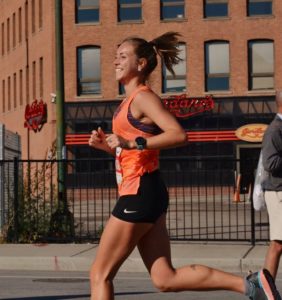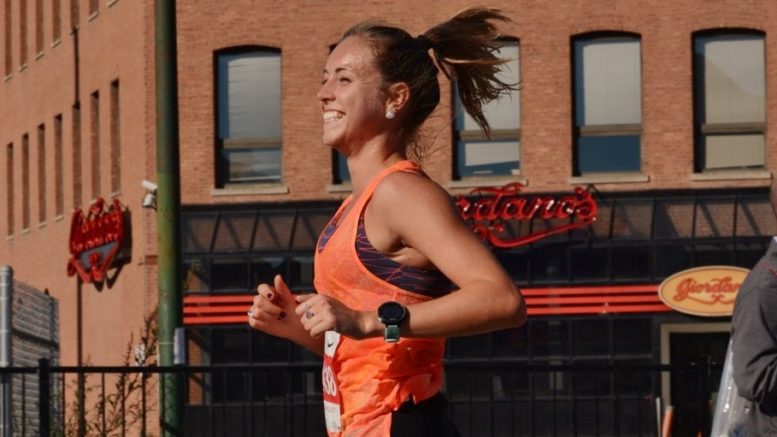
Pictured is Alexis Fairbanks, a 2009 OFA graduate, running in the 2017 Chicago Marathon. She recently participated in the 2018 Boston Marathon on April 16, where she finished in 3:08, and which placed her at 223 among women. Fairbanks is co-founder of the nonprofit, The Lane 9 Project, a community of active women and activists who speak out about women’s health, nutrition, fertility and running. (Provided photo)
A 2009 OFA graduate, Alexis Fairbanks knows a little bit about running. First taking off at age 12 on the seventh grade track team, she added cross-country in eighth grade and then continued running in her high school years. Her passion for running followed her to SUNY-Cortland, where she participated on the track and cross-country teams. While at Cortland, Fairbanks earned a Bachelor’s Degree in Early Childhood Education and Teaching.
Today, Fairbanks lives and works in the Washington, D.C. area, and, on any given day, you can find her running there as part of her regular routine. Now in her third year as a third grade teacher in Arlington, Va., Fairbanks previously taught Kindergarten in Prince George’s County in Maryland.
When asked about her current home of five years, Fairbanks replied, “I love the area here.”
Fairbanks’ love for teaching took her to South Africa last year with the organization One Heart Source, where she stayed for nearly three weeks mentoring middle school youth.
A remarkable achievement, Fairbanks competed in her third Boston Marathon on April 16, her ninth marathon to date. She finished in 3:08, which placed her at number 223 among women.
Fairbanks’ Boston finish was both exciting and bittersweet. Looking back, her second Boston Marathon was one of her slowest marathons to date, so for this year’s race she changed up her training method and sought out help from a coach. Not only did her workouts improve, she also learned what her body could really do, as well as found joy in the process.
Fairbanks has enjoyed running for years, although it hasn’t always been joyful.
A disordered eating pattern developed in her teens, and in turn resulted in an undernourished body and low self-esteem. Fairbanks explained that she believed then that thinness was the key to fitness and never really saw it as a problem. When she didn’t race well, she would punish herself with food restriction in hopes that it would improve her race times.
Fairbanks commented that college robbed her of her joy of running and while there experienced a stress fracture that put a halt to her running for two months. Once healed, she said she pulled out her stubbornness-card and forged ahead, although the results were disappointing. Fairbanks developed a second stress fracture when training for her first marathon following graduation from Cortland.
Step ahead to present-day, and Fairbanks’ new passion is making a difference in the lives of others.
Last year Fairbanks completed a Masters of Science Degree in Health Promotion Management from American University. It was this accomplishment, plus meeting like-minded new friends in D.C., that has helped recharge her confidence level, and as a result, running is much more relaxing and actually fun.
Fairbanks co-founded of a non-profit called the “Lane 9 Project” in 2017 along with Heather Caplan and Samantha Strong. The trio focus their energies on educating and empowering active women on the subjects of health, nutrition, fertility and running, while also advocating about the Female Athlete Triad, a mix of interrelated conditions; namely, amenorrhea (an abnormal absence of menstruation), low energy availability (with or without disordered eating), and low bone density.
A figurative term, “Lane 9” is a lane on the track that makes dedicated athletes doubt themselves and also have feelings of inadequacy and worthlessness.
Fairbanks explained that she was amenorrheic due to low calorie consumption and learned that the combination of disordered eating, menstrual irregularities and bone loss described what she had been experiencing. Although she recognized characteristics of the Female Athlete Triad while a senior at SUNY-Cortland, it didn’t completely click until she met Caplan and Strong.
Fairbanks stated, “I’d actually drifted toward ‘Lane 9’ during high school,” adding that she spent much of her time in Lane 9 at Cortland following her first stress fracture.
Today, the Lane 9 Project is working toward reaching out to youth in area high schools to help educate, reduce the stigma and raise awareness.
Talking about it and writing about it, as well as realizing she is not alone with the condition has helped her move forward. Fairbanks often writes about her experiences on the Lane 9 web site and contributed a piece to “Runner’s World” magazine in the “Other Voices” section.
Fairbanks said, “This is a widespread issue,” adding that she encourages women and girls to connect, share stories and heal together.
The Lane 9 Project can be found on Facebook, Instagram and Twitter, or visit the website, https://medium.com/lane-9-project.
For individuals having thoughts about starvation, binging or purging, call the anonymous helpline at the National Eating Disorders network at (800) 931-2237.



Be the first to comment on "OFA grad works to inspire female athletes"